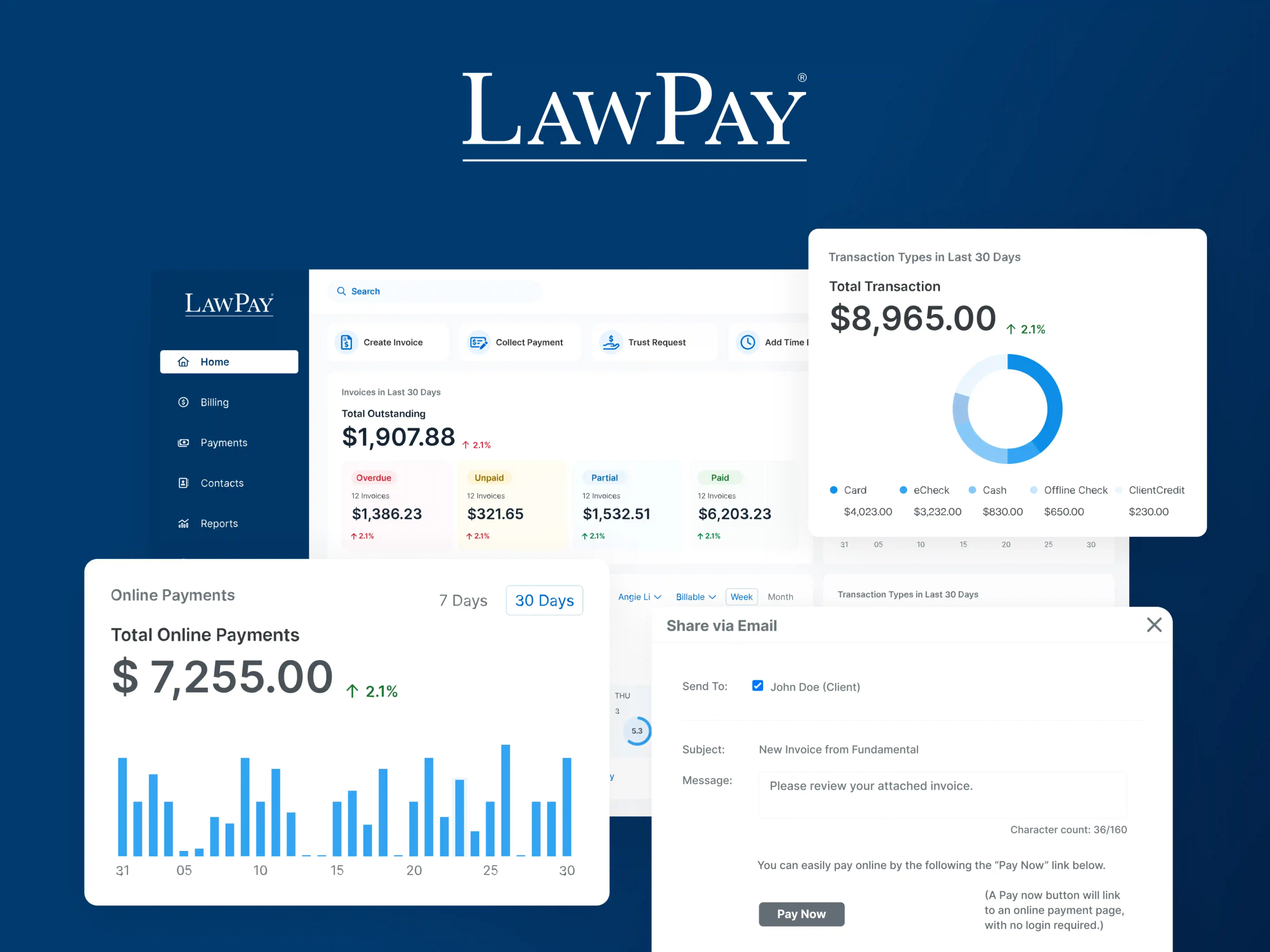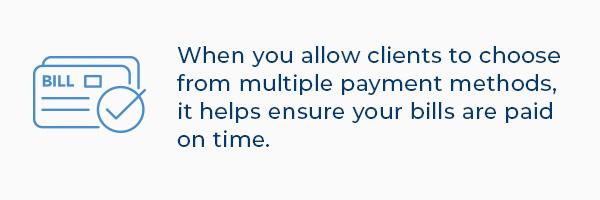Cash is no longer king. Alternative payment methods are here for good, and the legal industry is no exception.
With nearly nine-in-ten Americans using some form of digital payment, today's clients are more tech-savvy than ever. Is your law firm meeting their digital demand?
In this article, we'll explain the different types of alternative payment methods, share which ones make the most sense to offer for legal services, and give you seven benefits of accepting them at your firm.
Let's get started.
Schedule a demo to see what LawPay can offer your firm.
Get a demo
What Is an Alternative Payment Method?
Alternative payment methods (APMs), also known as local payment methods (LPMs), are means of paying for goods or services through methods other than cash or major credit cards. They offer consumers more options to complete transactions, while making it simpler for businesses to collect payments and boost sales. Some common APMs include:
Bank transfers
Electronic checks
Digital wallets
Prepaid cards
Virtual cards
Payment installments (Buy Now, Pay Later)
What Are the Different Types of Alternative Payments That Firms Can Use?
APMs are a matter of convenience and understanding your clients' needs is key to determining which alternative payments to offer.
For law firms, some methods make more sense than others. Let's review which ones resonate with today's legal clients.
Bank Transfers
Bank transfers are one of the most popular choices for clients to pay for legal services. They operate by removing funds from the client's bank account and depositing it into the firm's account. You may also see this alternative payment method referred to as an ACH transfer or electronic check (eCheck), with each functioning in a similar manner.
First, a client enters their bank account information. They then authorize a transaction for a single, one-time payment or ongoing, recurring payments for law firms. Once approved, the funds transfer from the client's account to the law firm's account.
If your firm uses a legal payment processing software, like LawPay, bank transfers will be an integral component of their billing services. At LawPay, eCheck payments for law firms make it easy to collect more quickly and securely than leaving a paper trail with traditional checks. In just a few steps, clients can conveniently set up their transfer(s) as you watch a steady cash flow into your account.
Legal Fee Financing
With half of Americans using payment plans in 2022, legal fee financing is a powerful APM that is standard practice at modern law firms. It's also the key to getting paid in full—and faster.
Legal fee financing allows clients to avoid total upfront charges and pay over time with installments. It makes legal services more accessible to those who need it most and helps firms boost their profitability.
While traditional law firm installment plans are a reliable source of steady income, innovative financing solutions exist that help firms get paid 100% of the cost upfront.
Take LawPay's Pay Later, for example.
With this proprietary APM, firms receive the full invoiced amount at the start of the engagement. Clients, on the other hand, continue to pay in smaller installments and benefit from the luxury of time.
Also, if a client doesn’t fulfill their loan repayment, your firm is covered. Collection is performed by the third-party lender and your firm remains unaffected.
Electronic Wallets
Electronic wallets (e-wallets), also called digital wallets, are another popular choice for clients due to their convenience.
After loading cash to their e-wallet through a bank transfer or credit card, consumers can then shop online or in store without having to provide the actual card or banking information. They allow for immediate access to a variety of payment methods and are presented via a mobile device, tablet, or computer. Some of the most common digital wallets include:
Apple Pay
Google Pay
PayPal
Stripe
Venmo
Zelle
The caveat?
Accepting payments for legal services through e-wallets requires caution and keeping a close eye on your state’s emerging ethical opinions.
For example, in 2021, the Florida Bar released their Proposed Advisory Opinion 21-2, which allows lawyers to accept payments via online payment apps, there are certain requirements law firms must fulfill to protect confidentiality and safeguarding of funds.
On confidentiality, lawyers must ensure that all transactions are private. Some popular digital payment platforms, like Venmo, allow users to share their transactions with friends on the app. Lawyers will need to apply a privacy setting that guarantees no information about transactions will be shared.
As for the safeguarding of funds, receiving funds to trust accounts gets a bit trickier. Lawyers will need to prevent commingling of funds and take on any fees charged for transferring funds. Details will differ by app, but ultimately, the responsibility is on the lawyer to make sure they are taking the appropriate steps to follow Bar rules.
A good place to start understanding the conditions of a specific app is by reviewing its user agreement and terms of services.
Virtual Cards
Virtual cards are rising in popularity, with an expected worth of $1.3 trillion in the American market by 2032. Unlike digital cards that reflect a credit card's actual account number, virtual cards substitute this information with a randomly generated number.
Virtual cards are still tied to the same account as, say, a digital card, but they allow one to enter different payment information when processing an online transaction. This process bypasses the need to share sensitive account details, creating an even more secure shopping experience.
At law firms, some legal billing software accept virtual cards through a manual process, while others streamline the process and automate it for you. LawPay grants free access to the Legal Payments Network, which uses virtual card processing to create secure transactions with quick 1-2 business day turnaround times. Clients enjoy peace of mind, and legal professionals get paid right on time.
What Are the Benefits of Using Alternative Payment Methods?
With many law firms slow to adopt modern payment trends, offering alternative payment methods that meet your clients' needs can give your firm an impressive competitive advantage.
Let's review the top seven reasons to accept alternative payments at your firm.
Meet Your Clients’ Modern Billing Expectations
It's becoming increasingly rare to find businesses that do not accept alternative online payment methods. And when today’s consumers encounter a business that doesn’t offer these options, they take their business elsewhere. Therefore, it’s essential to offer the most modern payment options to your clients if you don’t wish to lose them to one of your competitors.

Gain a Competitive Advantage
Conversely, if most of your competitors are still clinging to traditional forms of payment, you can make your firm more appealing by offering alternative payment methods.
Adopt the latest and most popular payment options and make it well known your firm accepts them for your services. Then, when clients in your area are searching for a law firm to take their case, yours will be in the prime position.
Attract a Wider Range of New Clients
No two clients are the same. Each client you take on will often have unique needs that require a tailored approach and strategy to achieve the desired outcome. The same can be said for their payment preferences.
While some clients may still want to pay by check, others would rather pay with digital options. By accepting payments via an assortment of online payment methods, your firm can meet your clients’ preferences with ease.
Foster More Trust in Your Clients
Offering more payment options fosters an accommodating environment that puts the client experience front and center. Should one payment method not work for any reason, clients will always have another option to fall back on.
You can reinforce this notion by maintaining PCI compliance every year and making it clear you take every precaution to keep their payment data safe—regardless of which method they choose.

Create a Billing Backup Plan
Accepting alternative payment methods also prevents transactions from coming to a screeching halt if a client has a problem with their preferred payment type. For example, if a client’s bank isn’t authorizing the charge, you can offer alternate payment options to process the transaction. This keeps late invoices at bay and maintains a steady cash flow. Your clients will also appreciate the fact that you can accommodate them in a last-minute manner, increasing their satisfaction with your services.
Boost Your Cash Flow
Many traditional payment methods are slow-moving, often taking several days to be deposited and settled. If your firm is only relying on one or two methods of getting paid, you run the risk of significantly capping the speed of your cash flow.
However, if your firm has alternate payment options, you can process transactions and receive deposits at a much faster rate—without preventing your clients from paying with more traditional methods if they so choose.
Plus, the best online payment solutions will be able to track different payment options, so you’ll always know the status of your cash flow.

Increase Your Chances of Getting Paid
When you allow clients to choose from multiple payment methods, it helps ensure your bills are paid on time and in full. If they can pay your bill the way they want to, there’s a good chance they’ll pay in the first place.
And, if there’s ever an issue with a specific payment method, you’ll have the solution with alternate methods.
Firms that offer alternative payment options also position themselves as much more client-centric by keeping the needs of their clients top of mind from the beginning of the case to the end. The more mindful you are of your clients' needs, the more likely they are to become repeat clients (and recommend your services to others).
Give Clients More Payment Options With LawPay
Ultimately, offering clients alternative payment options is a necessary step for law firms in 2023 and beyond. Clients have more options than ever for legal services and removing barriers to pay can make the difference when choosing your firm over another with antiquated payment processes.
Schedule a demo to see what LawPay can offer your firm.
Get a demo
LawPay keeps you ahead of the curve by staying in tune with financial trends that meet clients' demands. Accept payments the way you want, and clients need, with LawPay’s robust offering of alternative online payment methods. Whether it's processing eChecks, setting up recurring payments via bank transfers, or getting paid 100% upfront with Pay Later, LawPay stays flexible and secure every step of the way.
To learn more, schedule a demo today.
About the author

Gabriela JheanContent Writer
Gabriela Jhean is a Content Writer for leading legal software companies, including MyCase, Docketwise, CPACharge, CASEpeer, and LawPay—the #1 legal payment processor. She covers emerging legal technology, financial wellness for law firms, the latest industry trends, and more.
